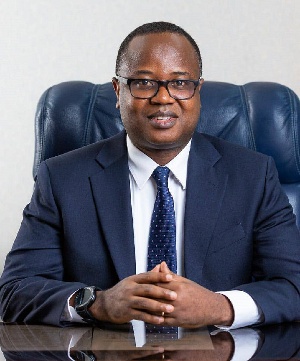 First Deputy Governor of the Bank of Ghana
First Deputy Governor of the Bank of Ghana
On February 27, 2021, Dr. Maxwell Opoku-Afari, the First Deputy Governor of the Bank of Ghana delivered a guest lecture “on COVID-19 Crisis and Monetary and Macro-Financial Policy Response” during an MSc Development Finance class session facilitated by Prof. Joshua Y. Abor and Dr. Lordina Amoah.
The lecture was also attended by other graduate students in the School. Dr. Opoku-Afari shared insights regarding the effect of COVID-19 on the country’s economy and the policy responses initiated to mitigate and remedy the fallouts.
Commencing with a brief history of the pandemic, Dr. Opoku-Afari described the implications of the global health crisis on our economy and the world economy by extension.
He indicated that the imposition of restrictions to halt the spread of the virus lead to the disruption and halting of global supply chains. Also, he revealed that the resultant slump in the global economy heightened uncertainty in the financial markets, which led to decisive and bold global fiscal and monetary policy responses. However, he opined that the pandemic has paved the way for many lessons to be learned by policymakers.
Per IMF growth predictions, Dr. Opoku-Afari averred, citing fluctuating growth percentages and predictions, that global growth for 2020 was very volatile, owing to the COVID-19 pandemic. He also described policy responses to manage the effects of the pandemic as decisive and broad-based, which occasioned the deployment of both conventional and non-conventional policies. Some of these included governments embarking on large fiscal stimulus packages and social interventions, the easing of monetary policies, among others.
With the spotlight on Ghana’s economy, Dr. Opoku-Afari intimated that the leading indicators of economic activities suggested a retardation, stemming from restrictions like social distancing, partial lockdowns and other preventive measures introduced by the government since Ghana recorded its first few cases. Dr. Opoku-Afari shared numerous policy responses implemented by the Bank of Ghana’s Monetary Policy Committee to curb the effects of the pandemic.
They included a reduction in the policy rate by 150 basis points to 14.5%, collaborating with commercial banks to create a GHS 3 billion credit facility for key industries, including pharmaceuticals, hospitality, services, and manufacturing sectors, among others. He further postulated that the policy measures, in addition to the comprehensive financial sector reforms before the pandemic, have helped moderate the impact of COVID-19 on the Ghanaian economy. In conclusion, Dr. Opoku-Afari was positive that even though the pandemic has adversely affected the Ghanaian economy, the policy response, in addition to the comprehensive financial sector reforms, has helped the country moderate its impact.
Dr. Maxwell Opoku-Afari is currently a Corporate Executive in Residence (CEiR) at the Department of Finance for the 2020/21 Academic Year. He is currently the First Deputy Governor of the Bank of Ghana. Before assuming the role of Deputy Governor, Dr. Opoku-Afari worked at the International Monetary Fund (IMF), rising through the ranks to the level of Deputy Division Chief, and Mission Chief.
Maxwell Opoku-Afari’s work at the IMF also focused on policy design, in particular, on monetary policy modernization and macro-financial linkages. He has co-authored a number of IMF Policy Papers including one on “Modernizing Monetary Policy Frameworks in Low and Developing Countries” and another on “Monetary Policy Conditionality for Countries with Evolving Monetary Policy Regimes”.
These two policy papers are currently being used to drive modernization of monetary policy frameworks in a number of low and developing countries. He has extensive publications on monetary policy, inclusive growth, short-term output indicators in low-income countries, aid effectiveness, and on capital flows and real exchange rate dynamics.
Prior to joining the IMF in 2009, Dr. Opoku-Afari worked for 13 years at the Bank of Ghana, rising through the ranks to become the Head of the Special Studies Division in the Research Department.
This was between January 2005 and June 2006, and was later elevated to the position of the Special Assistant to the Governor of Bank of Ghana, from June 2006 until he left the Bank of Ghana in October 2009. He was also a member of the Government of Ghana’s Capital Markets Committee from 2006 to 2008. He holds a first degree in Economics and Statistics, and an MPhil in Economics, both from the University of Ghana, Legon and also a Ph.D. in Economics from the University of Nottingham in the United Kingdom.